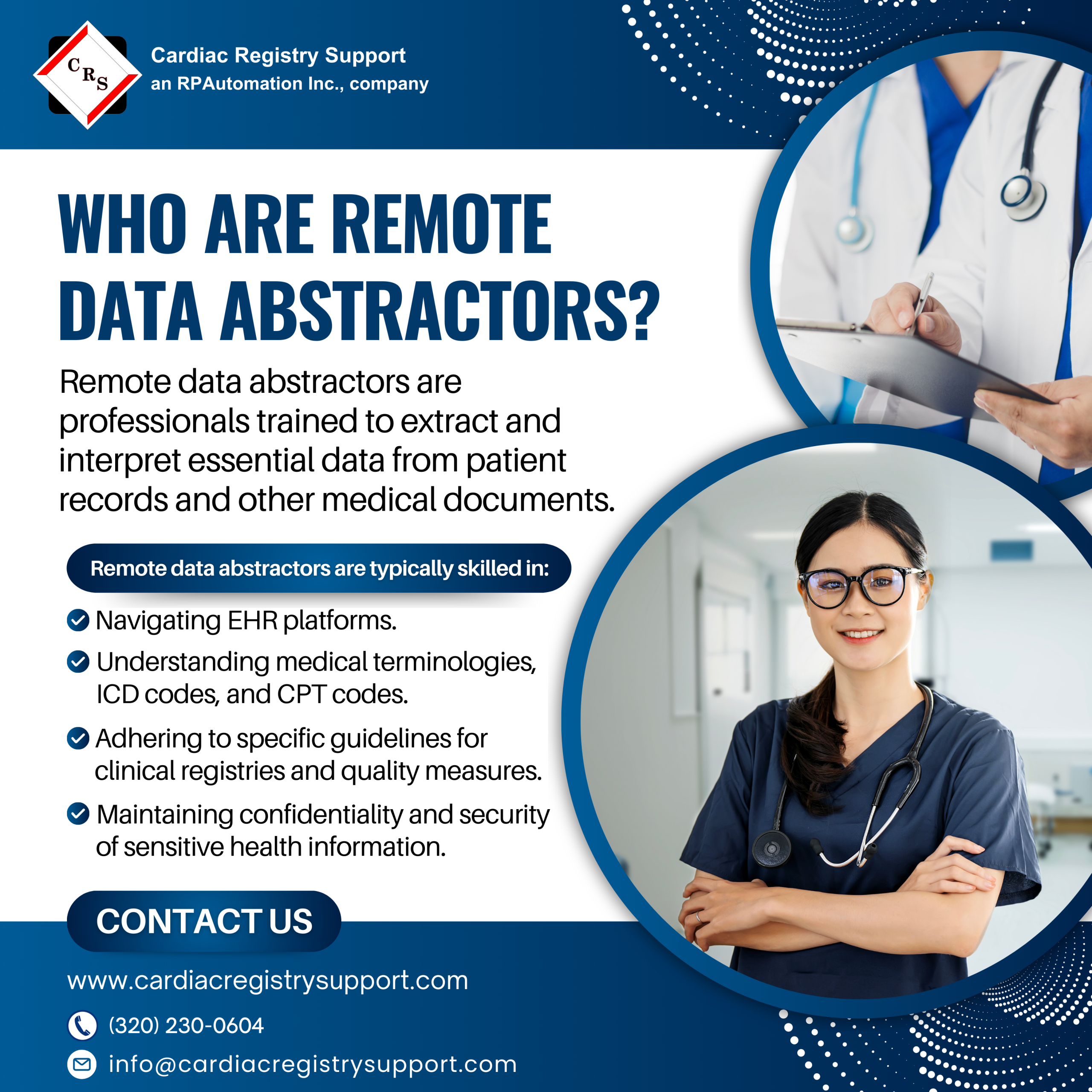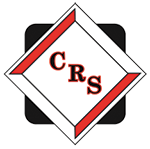In today’s data-driven healthcare environment, accuracy in hospital registries is more critical than ever. Whether for quality improvement, compliance, or research, precise and timely data abstraction ensures that hospitals meet regulatory standards and improve patient outcomes. However, maintaining this level of accuracy in-house can be challenging due to staff shortages, burnout, and the complexity of ever-evolving registry requirements.
This is where remote data abstractors come in. By outsourcing to specialized experts, hospitals can enhance registry accuracy, efficiency, and compliance—all while reducing operational burdens.
In this article, we’ll explore the role of remote data abstractors, how they compare to in-house teams, and why leading organizations like Cardiac Registry Support and Quality Health Data have embraced remote abstraction solutions.
What is a Remote Data Abstractor?
A remote data abstractor is a trained professional who collects and analyzes clinical data from electronic health records (EHRs), charts, and other sources to ensure hospital registries remain accurate, up-to-date, and compliant. Unlike traditional in-house abstractors, these experts work remotely—allowing hospitals to leverage top talent nationwide without geographical constraints.
They specialize in various clinical registries, including:
 CathPCI, STS, NSQIP, and GWTG (Cardiac & Surgical Registries)
CathPCI, STS, NSQIP, and GWTG (Cardiac & Surgical Registries)
 Oncology, Trauma, and Stroke Registries
Oncology, Trauma, and Stroke Registries
 CMS, AHRQ, and Joint Commission Reporting
CMS, AHRQ, and Joint Commission Reporting
How Remote Data Abstractors Improve Accuracy in Hospital Registries
1. Expertise in Complex Data Abstraction
Hospital registries require highly specialized knowledge of medical coding, quality metrics, and clinical guidelines. Remote data abstractors are:
 Registry-certified professionals (e.g., RHIA, RHIT, CCS)
Registry-certified professionals (e.g., RHIA, RHIT, CCS)
 Continuously trained on new registry updates & compliance changes
Continuously trained on new registry updates & compliance changes
 Experienced in various EHR systems (Epic, Cerner, Meditech, etc.)
Experienced in various EHR systems (Epic, Cerner, Meditech, etc.)
2. Reducing Errors & Ensuring Data Integrity
Errors in hospital registries can lead to misreporting, compliance penalties, and compromised patient care. Remote abstractors:
 Follow rigorous quality assurance processes
Follow rigorous quality assurance processes
 Conduct double-blind data reviews to minimize errors
Conduct double-blind data reviews to minimize errors
 Utilize AI-driven quality checks for greater precision
Utilize AI-driven quality checks for greater precision
3. Scalability & Flexibility for Hospitals
Hospitals often struggle with fluctuating data volumes—especially during audits, accreditation periods, or registry updates. Remote abstractors provide:
 On-demand scalability (expand or contract as needed)
On-demand scalability (expand or contract as needed)
 Faster turnaround times for urgent abstraction needs
Faster turnaround times for urgent abstraction needs
 24/7 availability to meet strict deadlines
24/7 availability to meet strict deadlines
4. Cost Savings & Operational Efficiency
Hiring and training in-house data abstractors is expensive and time-consuming. By outsourcing, hospitals can:
 Reduce labor costs (no benefits, PTO, or training expenses)
Reduce labor costs (no benefits, PTO, or training expenses)
 Minimize EHR-related delays with remote experts trained across multiple platforms
Minimize EHR-related delays with remote experts trained across multiple platforms
 Free up internal resources to focus on patient care & clinical quality
Free up internal resources to focus on patient care & clinical quality
 Case Study: One large healthcare system switched to remote abstraction with Cardiac Registry Support and reduced data entry errors by 43% while cutting costs by 30%.
Case Study: One large healthcare system switched to remote abstraction with Cardiac Registry Support and reduced data entry errors by 43% while cutting costs by 30%.
Why More Hospitals Are Choosing Remote Data Abstraction
With increasing pressure to meet registry deadlines, maintain compliance, and improve patient outcomes, remote data abstraction is becoming the preferred solution for hospitals nationwide.
Key Benefits of Remote Data Abstractors:
 Higher Accuracy: Specialists trained in complex clinical registries
Higher Accuracy: Specialists trained in complex clinical registries
 Scalability & Speed: Quickly adapt to fluctuating workloads
Scalability & Speed: Quickly adapt to fluctuating workloads
 Cost-Effective: No overhead costs for full-time staff
Cost-Effective: No overhead costs for full-time staff
 Compliance & Quality Assurance: Stay ahead of CMS, STS, and AHA reporting requirements
Compliance & Quality Assurance: Stay ahead of CMS, STS, and AHA reporting requirements
Final Thoughts: Improve Registry Accuracy with Remote Data Abstraction
Hospitals looking to enhance data quality, reduce errors, and optimize resources should consider remote data abstraction as a strategic solution. By partnering with trusted providers like Quality Health Data, and Cardiac Registry Support, organizations can achieve higher accuracy, compliance, and efficiency in hospital registries.
 Looking for expert remote data abstraction services?
Looking for expert remote data abstraction services?
Visit Cardiac Registry Support to learn how our team of certified data abstractors can help your hospital improve registry accuracy while reducing costs and compliance risks.


